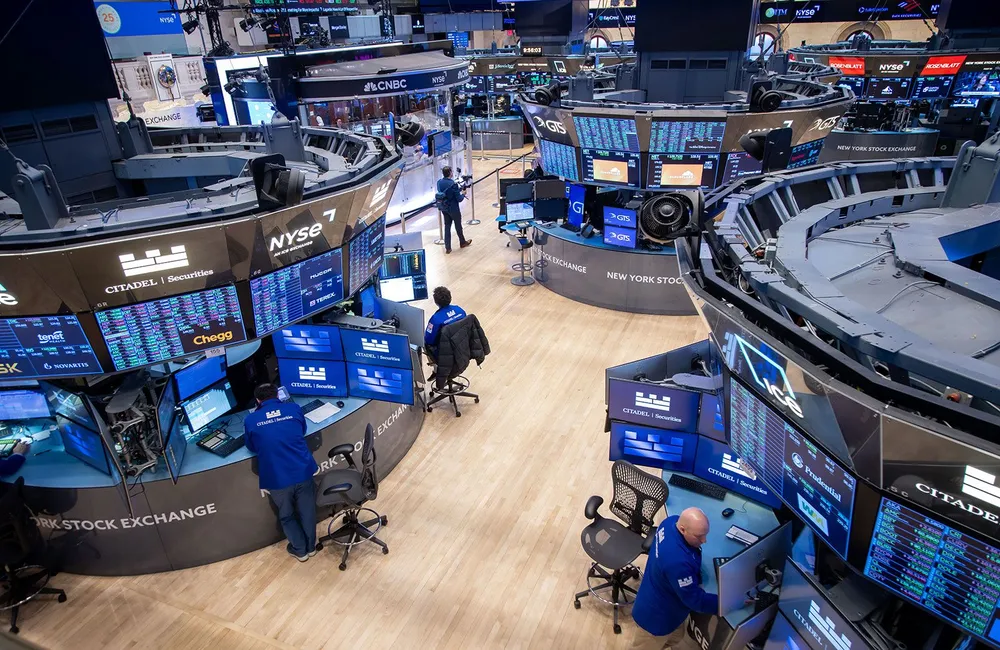As of Monday morning, ASX futures were 102 points, or 1.5%, lower at 6664, indicating a fall at the open.
Stocks in the US slumped on Friday in the latest swing in markets after a turbulent week that brought big turns in both directions.
Gargantuan moves up and down reflect just how jumpy investors have become this year. Yet inflation has persisted at uncomfortably high levels, even though the Fed has been raising rates at its fastest clip since the early 1980s. Economic growth has been slowing as well. That has led many investors to pile into bets against the market — which they have sometimes, as on Thursday, sharply reversed.
“The setup was good for an opposite move, as we frequently see a posturing like this when position has been lopsided,” Jason Goepfert, president of Sundial Capital Research, said in an email.
The S&P 500 lost 86.84 points, or 2.4 percent, to 3,583.07 and ended the week down 1.6 percent. The Dow Jones Industrial Average fell 403.89 points, or 1.3 percent, to 29,634.83 and gained 1.2 percent for the week. The Nasdaq Composite fell 327.76 points, or 3.1%, to 10,321.39 and lost 3.1% across the week.
In commodity markets, Brent crude fell $3.63 a barrel, gold slipped 1.3% to US$1,644.47.
In fixed income markets, the yield on Australian 2 Year notes was up at 3.38% and the 10 Year at 4%. The yield on 2 Year US Treasury notes spiked up to 4.5% and the yield on the 10 Year US Treasury notes increased to 4.02%.
The Australian dollar tumbled to 62 US cents. The Wall Street Journal Dollar Index, which measures the dollar against 16 other currencies, rose to 105.09.
Asia
Shares in China finished higher in improved sentiment across Asia after a rebound on Wall Street and ahead of China's party congress kicking off this Sunday. Investors can focus on the three companies that have begun clinical trials for drugs targeting the Omicron variant, Soochow Securities says in a note, as shares in pharmaceutical companies are soaring amidst the positive updates. Jiangsu Hengrui Medicine and WuXi AppTec both climbed 10 percent. Some stocks rose on positive earnings outlooks. The Shanghai Composite Index rose 1.8% to 3071.99, the Shenzhen Composite Index gained 2.6% and the ChiNext Price Index increased 3.6%.
Hong Kong’s Hang Seng Index finished up 1.2% at 16587.69 to snap a six-session slide and recover what had been an 11-year low. Sentiment was lifted after a strong advance on US stock markets overnight, even as the latest figures showed stubbornly high inflation, although the city’s benchmark index trimmed gains late in the day. Pharmaceutical shares were among the biggest gainers, led by Wuxi Biologics, which rose 8.6%, and Sino Biopharm, which climbed 6.5%, while shares in property developers Country Garden Holdings and Longfor Group were up 4.3% and 3.0% respectively. The Hang Seng Index was still down 6.5 percent for the week.
Stocks in Japan closed broadly higher, as large gains in electronics and pharmaceutical stocks helped them recover from recent selloffs driven by concerns about the global economic outlook. Among the individual movers, Fast Retailing surged 8.4% after it forecast an 18% rise in fiscal-year operating profit. The Nikkei Stock Average ended 3.3% higher at 27090.76, marking its largest percentage gain in more than a month.
Europe
European stocks climbed on Friday, trimming steeper gains, as investors awaited the potential fallout from UK political chaos. The pan-European Stoxx Europe 600 rose 0.6 percent, with the French CAC 40 and German DAX up 0.9 percent and 0.7 percent, respectively.
UK Prime Minister Liz Truss press conference was shaky and lacking detail despite news of plans to reinstate a corporation-tax increase, Evercore says. “Her performance (in which she ended up blaming markets for the mess the UK fiscal situation is in) was not confidence-enhancing, with UK assets trading very sharply headed below before they recovered most of the hit in coming trading,” according to Evercore analysts. “There’s increasing speculation that a rebellion among party MPs to oust her in the coming weeks is mounting.”
The FTSE 100 Index in London was 0.3 percent, or 22 points higher, at 6871. Property stocks Rightmove, Persimmon, Barratt Developments, Taylor Wimpey and Berkeley Group Holdings are among the biggest blue-chip risers as mortgage-market uncertainty eases on hopes that, along with the change of U.K. finance minister, planned to freeze corporation tax have been reversed.
Get Ready for a Rate War
Mortgage holders and prospective home loan applicants can expect competitive mortgage deals to return after mortgage rates shot up 1-2 per cent after the budget statement, Interactive Investor says. “But the mortgage market is still unforgiving for buyers. Rates are moving every day, though,” said Interactive personal-finance analyst Myron Jobson.
North America
U.S. stocks dropped Friday, the latest about-face in markets after a week of huge gyrations that directly reflected investors’ inability to determine what comes next for the world’s two largest economies.
Stocks dropped to begin the week, and then tumbled again early Thursday after data released in the morning demonstrated that inflation had accelerated more sharply in September than expected dashing the hopes of investors who were looking for a report that would give the Federal Reserve a reason to ease back on its interest-rate increases.
Then the unexpected happened. Stocks rose, closing the day in positive territory. According to Dow Jones Market Data, Thursday was the first day both of those things have happened in the same trading session.
Two titanic movies, both up and down, indicate just how on edge investors have become this year. Inflation has stayed strikingly high, even as the Fed raises rates at the fastest pace since the early 1980s. Economic expansion is also decelerating. That has caused many investors to pile up bets against the market which they have sometimes rendered suddenly unmade, as they did on Thursday.
“The setup was right for an inverse move, because this is the kind of thing we tend to see when positioning is very one-sided,” said Jason Goepfert, president of Sundial Capital Research, in an email.
The S&P 500 fell 86.84 points, or 2.4 percent, to 3,583.07 and ended the week down 1.6 percent. The Dow Jones Industrial Average fell 403.89 points, or 1.3%, to 29,634.83 and gained 1.2% this week. The Nasdaq Composite fell 327.76 points, or 3.1%, to 10,321.39, and was down 3.1% for the week.
Stocks sold off across the board on Friday, as every sector in the S&P 500 closed in the red. The materials and consumer-discretionary sectors were some of the worst performers.
Bank shares were mixed after large lenders announced that their profits were falling in the third quarter. The KBW Nasdaq Bank Index dropped 1.4 percent. JPMorgan Chase shares rose $1.82, or 1.7 percent, to $111.19. The bank’s revenue increased more than expected, driven by strong consumer spending, higher interest rates and robust results on its trading desks. Wells Fargo gained 1.9 percent after the bank’s net interest income rose, one of the factors that propelled its revenue to a stronger-than-expected level. Morgan Stanley was the exception. Its shares dropped $4.02, or 5.1 percent, to $75.30 after the bank undershot analysts’ estimates for profits and revenue.





















